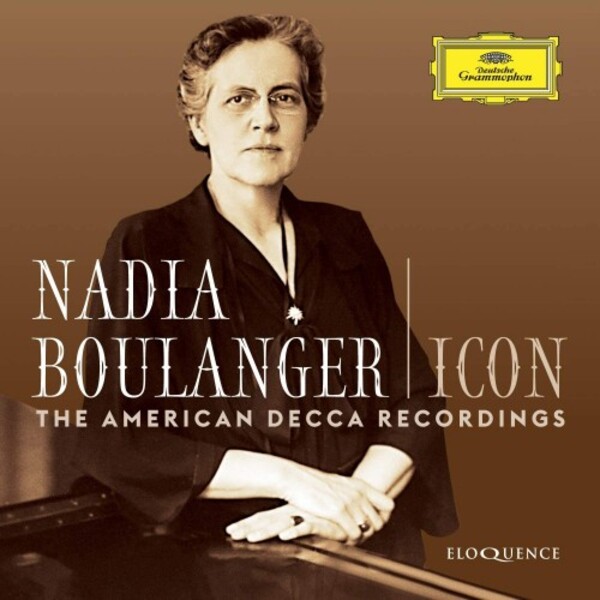
Nadia Boulanger: Icon - The American Decca Recordings
£32.25
In stock - available for despatch within 1 working day
Despatch Information
This despatch estimate is based on information from both our own stock and the UK supplier's stock.
If ordering multiple items, we will aim to send everything together so the longest despatch estimate will apply to the complete order.
If you would rather receive certain items more quickly, please place them on a separate order.
If any unexpected delays occur, we will keep you informed of progress via email and not allow other items on the order to be held up.
If you would prefer to receive everything together regardless of any delay, please let us know via email.
Pre-orders will be despatched as close as possible to the release date.
Label: Australian Eloquence
Cat No: ELQ4841384
Format: CD
Number of Discs: 5
Genre: Vocal/Choral
Release Date: 13th November 2020
Contents
Works
Francion vint l'autre jourLiebeslieder-Walzer, Neue (15), op.65
Quartets (3), op.64
Quartets (4), op.92
Mignonne, allon voir si la Roze
Noblesse git au Coeur
Mille regretz
Ce moys de may
Le chant des oyseaux
Hellas, mon Dieu ton ire s'est tournee
Revecy venir du printemps
Tu ne l'enten pas, c'est latin
Bonjour, mon coeur
Quand mon mari s'en va dehors
Vous me tuez si doucement
Madrigals, Book 4: SV75-93
Scherzi musicali
Castor et Pollux (excerpts)
Dardanus (excerpts)
Hippolyte et Aricie (excerpts)
Les Fetes d'Hebe (excerpts)
Les Indes galantes (excerpt)
Au joly boys
Hau, hau, hau le boys
A declarer mon affection
Artists
Nadia Boulanger (harpsichord, piano)Doda Conrad (bass)
Bernard Cottret (bass)
Hugues Cuenod (tenor)
Bernard Demigny (bass-baritone)
Paul Derenne (tenor)
Maria Feres (mezzo-soprano)
Jean Francaix (piano)
Violette Journaux (contralto)
Irma Kolassi (mezzo-soprano)
Jean Maciet (tenor)
Genevieve Massignon (soprano)
Donna Rumsey (soprano)
Nadine Sautereau (soprano)
Nancy Waugh (mezzo-soprano)
Flore Wend (soprano)
Instrumental and Vocal Ensemble
Conductor
Nadia BoulangerWorks
Francion vint l'autre jourLiebeslieder-Walzer, Neue (15), op.65
Quartets (3), op.64
Quartets (4), op.92
Mignonne, allon voir si la Roze
Noblesse git au Coeur
Mille regretz
Ce moys de may
Le chant des oyseaux
Hellas, mon Dieu ton ire s'est tournee
Revecy venir du printemps
Tu ne l'enten pas, c'est latin
Bonjour, mon coeur
Quand mon mari s'en va dehors
Vous me tuez si doucement
Madrigals, Book 4: SV75-93
Scherzi musicali
Castor et Pollux (excerpts)
Dardanus (excerpts)
Hippolyte et Aricie (excerpts)
Les Fetes d'Hebe (excerpts)
Les Indes galantes (excerpt)
Au joly boys
Hau, hau, hau le boys
A declarer mon affection
Artists
Nadia Boulanger (harpsichord, piano)Doda Conrad (bass)
Bernard Cottret (bass)
Hugues Cuenod (tenor)
Bernard Demigny (bass-baritone)
Paul Derenne (tenor)
Maria Feres (mezzo-soprano)
Jean Francaix (piano)
Violette Journaux (contralto)
Irma Kolassi (mezzo-soprano)
Jean Maciet (tenor)
Genevieve Massignon (soprano)
Donna Rumsey (soprano)
Nadine Sautereau (soprano)
Nancy Waugh (mezzo-soprano)
Flore Wend (soprano)
Instrumental and Vocal Ensemble
Conductor
Nadia BoulangerAbout
Composer, teacher, organist, pianist, harpsichordist, choir trainer, conductor, musicologist: there seemed to be no end to the talents of Nadia Boulanger, though she liked to insist that her gifts paled in comparison to her tragically short-lived sister, Lili. Nadia compensated with ceaseless industry. By the time of her early twenties, having studied with Fauré and undertaken the famously rigorous Paris Conservatoire formation, she was already reviving Bach cantatas in concert. In this guise she came to the attention of the American heiress and assiduous sponsor of avant-garde culture in Paris, the Princesse de Polignac, and with her support founded a vocal consort which made valuable and often-reissued HMV recordings of Monteverdi and Brahms in the 1930s.
Boulanger’s postwar recordings for American Decca, while also made in Paris, are much less widely known, having been issued on Brunswick LPs with limited availability outside the US and on Decca Gold in the US. Having returned to Paris after her wartime exile on the American east coast, she revived her consort for concerts at the Polignac salon, drawing together the most resilient of her older colleagues, such as the tenor Hugues Cuénod, with younger vocal talents such as Nadine Sautereau and Irma Kolassi, who had already established an international career for themselves but were devoted to Boulanger and her tender tyranny in securing precise, selfless and stylish performances of a repertoire that was still largely the exclusive property of scholars rather than musicians.
As well as returning to Monteverdi, the American Decca sessions of 1952–54 venture into what was then much less familiar territory, of chansons and madrigals by the likes of Josquin, Lassus and Le Jeune, winding up with a typically flamboyant Janéquin showpiece which imitates an entire aviary. Then there are pioneering records of excerpts from music-dramas by Charpentier and Rameau, and finally a return to Brahms’s domestic vocal music, though as with Monteverdi in ‘new’ and complementary repertoire, the Neue Liebeslieder and a selection from the more introspective late vocal quartets, opp. 92 and 112. On all these records Boulanger’s affection for the music shines through, as well as her scrupulous attention to the detail of its expression.
Error on this page? Let us know here
Need more information on this product? Click here